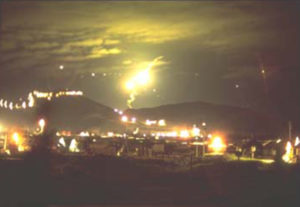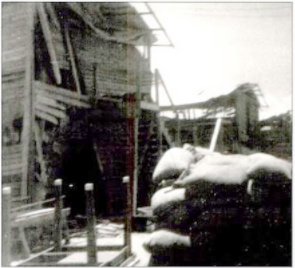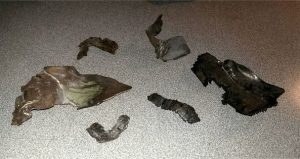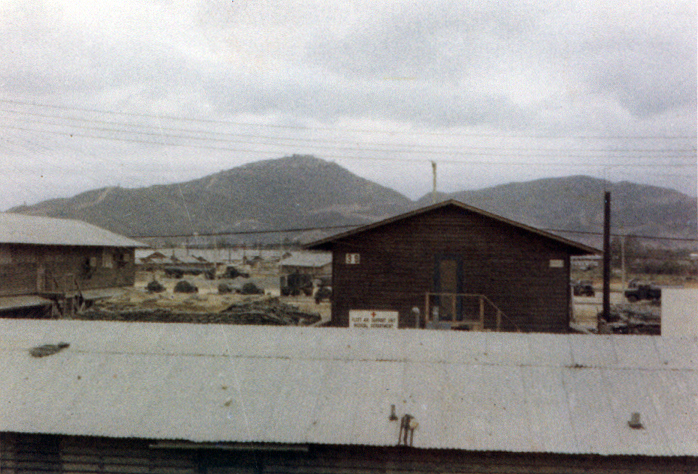This memoir focuses on the feeling of close calls in a combat zone. They were relatively rare for me as I was in a situation where I did not go looking for trouble; I just waited for it to come to me. It did, of course. However, I was in no way a combat soldier and did not live the physical misery and constant terror that was part of their job — compassion and respect for those who did.
The photo at the left is the scene looking west from my barracks at Da Nang Air Base. Rockets came at us just beyond the nearby hills. Photo by Scooter Smith.

During the Vietnam War, the nickname for Da Nang Air Base was “Rocket City.” I flew into it aboard one of my squadron’s C-130s during Tet, 1970.
Tet was the Vietnamese Lunar New Year celebration that always stirred up the Viet Cong and the North Vietnamese Army (NVA), although never as intensely as in the Tet Offensive of 1968.
Over the next few days following my arrival, the base suffered some rocket attacks, probes and sapper attacks around the perimeter.
The benefit of that explosive initiation was that I quickly learned to tell by their sound if rockets would hit nearby.
The base did have a warning system: a siren that sounded after the first rockets hit. So helpful.
For the next several months, I joined American, South Korean, and South Vietnamese military personnel and civilian contractors dodging Chinese 107mm rockets and Russian 122mm and 144mm Katyusha rockets. Most of these attacks just kept those of us in our part of the sprawling base awake at night as the only two NVA Rocket Artillery Battalions in South Vietnam devoted themselves to targeting fuel dumps and attack aircraft.
Although now and then, they directed volleys of rockets at VQ-1, an intelligence-gathering squadron.
My aircraft carrier support squadron, VRC-50, shared hangar space with them, and our barracks sat next to each other. Without VQ-1 attracting attention from the NVA, I think my time in there could have been little more dangerous than a non-combat zone duty station.
A year before I arrived in-country, the VQ-1 barracks took a couple of hits. Forty-five men were injured. Amazingly, none were killed. Nineteen of the injuries, however, occurred to men hunkering down in an open-top blast bunker.

From July 1965 until January 1973, Da Nang Airbase experienced more than 90 rocket attacks, resulting in over 600 casualties, including 45 killed. Also, 30 aircraft and two fuel dumps were destroyed (numbers vary a little from source to source).
By the time I arrived, our squadron’s barracks had been reinforced according to the lessons learned from the VQ-1 attack. A wall of sandbags now protected the first floor, and our bunker had a thick timber roof with sandbags sitting on top.
Thus, all of our lockers and racks (steel bunk beds) were on the first floor because nobody dared sleep on the second – resulting in them being crowded together and as well organized as a rat’s nest. *
During my time at Da Nang Air Base, I survived two narrow misses from rocket fire: one near our hangar and one at the barracks.
The first encounter was a rare attack during a relatively calm stretch that lasted for almost three months following the Tet fracas.
While waiting for our last flight to return late one evening, an airman named Neal and I took a break in the designated smoking area between the tarmac and the westernmost of the two airstrips. On our way back to the hangar, a volley of rockets started hitting in our vicinity. We dove into a shallow roadside ditch near the comm shack and flattened ourselves into the sand.
Neal cracked me up by feigning terror, screaming, “These buttons are too thick!”
We sobered up pretty damn fast when a rocket hit next to our hangar, about 40 yards away.
Minutes later, the attack was over. Neale and I looked up and, seeing sand stuck on each other’s sweaty faces, started laughing.
It was a scary enough event, though, which made our survival all the more thrilling. And, just maybe, we were still a little high from the “smoke break.”

My second close encounter occurred during an intense series of attacks in late April and early May. I still vividly recall the sudden panic of waking to the blast of a large rocket striking immediately outside our barracks. In the brief yellow light of the explosion, I saw guys in neighboring bunks scratching through mosquito netting and leaping to their feet as dust and debris spun around us. I assume my eyes were as wide and round with fear as theirs.
As more rockets hit nearby, we became part of a squadron detachment-sized mob madly scrambling through the dark for a bunker that was suddenly too far away.
All these young men stumbling, bumping into each other, and jamming up in the doorway gave me the impression of terrified roaches getting caught in the open at a square dance. The scene was pure slapstick and would have been hilarious had we not been so seriously intent on saving our lives.
Reliably late, the warning siren began to wail.
Electricity had been knocked out, so without the bunker’s single, bare light bulb it was coffin dark. At first, we groped around between sand and a low ceiling to find a spot on a bench or a comfortable place to crouch. Then somebody fired up a Zippo to help everyone get settled and do a head check. We were relieved to discover everyone was present.
From there on, we could only sit and hope to live through the most prolonged, powerful assault our squadron suffered while I was stationed there.
Talking ceased while everybody seemed to be caught up in their thoughts. Save for the explosions outside, the bunker would have been silent except for this one guy who moaned in terror during this and every rocket attack.
Always first to the bunker, he would be fully dressed and tightly wrapped in a flak jacket with a helmet on his head. Most of us, if we went to the bunker, wore helmets and flak jackets over underwear and flip-flops.
That the rockets may be hitting relatively far away did not matter to him. By contrast, upon hearing the clicking sound of the projectiles passing overhead, those of us who had been there awhile wouldn’t even stroll to the bunker. Sometimes we didn’t bother to look up from our books, card games, and conversations.
So, this guy came across as a scaredy-cat to a barracks full of teenagers and young men with no sense of mortality.
In his defense, and it’s a good one, he desperately wanted to return alive and in one piece to his wife and twin babies at our squadron’s home base in Japan.
Within a minute after we were sure the barrage ended, somebody giggled. Then someone chuckled in response, which cascaded until our dark sanctuary echoed with howling laughter.
We laughed until we cried, not just to celebrate our close call but at the folly of our immortal posturing.
Just as important, our laughter in the lightless depths of that bunker helped us escape for a moment the real darkness of the war outside.
* However, someone soon came up with a good use for that unused top floor: a squadron saloon!
Seabees supplied materials and let us borrow tools to build the bar in exchange for the jeep a few of our guys liberated from the Air Force and repainted.
As for stocking the bar, our aircraft flew to and from Cubi Point, our squadron’s detachment in the Philippines. So, we had no problem importing a couple of refrigerators and filling them with fresh-from-the-brewery San Miguel beer.
The only other beers available arrived in-country from mainland America after maybe months in transit. Imagine what sitting in hot warehouses and sloshing around in the hold of a supply ship across the Pacific Ocean did to it.
